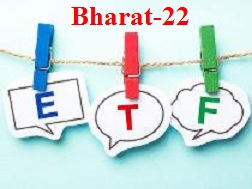On August 4, 2017, Finance Minister Arun Jaitley launched a new Exchange Traded Fund (ETF) under the name Bharat 22, comprising shares of 22 companies from 6 sectors of the economy. This decision comes on the basis of past experiments with CPSE-ETF which proved to be successful.
What is Exchange Traded Fund (ETF)?
An exchange-traded fund(ETF) is an investment fund traded on stock exchanges, just like stocks.
- An ETF holds assets such as stocks, commodities, or bonds and tracks an index, such as a stock indexor bond index.
- ETFs may be attractive as investments because of their low costs, tax efficiency, and stock-like features.
About Bharat 22 ETF:
Bharat 22 ETF will have a single company cap of 15 per cent, while a sectoral cap of 22 per cent will also be in place.
- It will comprise of the government’s holding in Specified Undertaking of Unit Trust of India (SUUTI), central public sector enterprises (CPSE) ETF and PSU
 banks.
banks. - The ETF will feature four banking stocks — SBI, Axis Bank, Bank of Baroda and Indian Bank — other than CPSEs such as Nalco, ONGC, IOC, BPCL and Coal India.
- Besides, there will be nine other PSUs as well as REC and PFC.
- SUUTI’s holding in ITC has also been included.
- ICICI Prudential is the fund manager for Bharat 22 ETF.
About CPSE ETF (Central Public Sector Enterprises Exchange Traded Fund):
In March 2014, Government had first launched a CPSE ETF (Central Public Sector Enterprises Exchange Traded Fund) where it raised Rs 3,000 crore through the initial public offering.
- The retail investors could buy into the fund by investing a minimum Rs 5,000. Following this, the government launched two follow-on public offers in February and March this year, raising Rs. 8,500 crore.
- CPSE ETF, comprises of 10 companies — Oil and Natural Gas Corp. (ONGC), Coal India, Indian Oil Corp. (IOC), GAIL (India), Oil India, Power Finance Corp. (PFC), Bharat Electronics, Rural Electrification Corp. (REC), Engineers India Ltd and Container Corporation of India.





